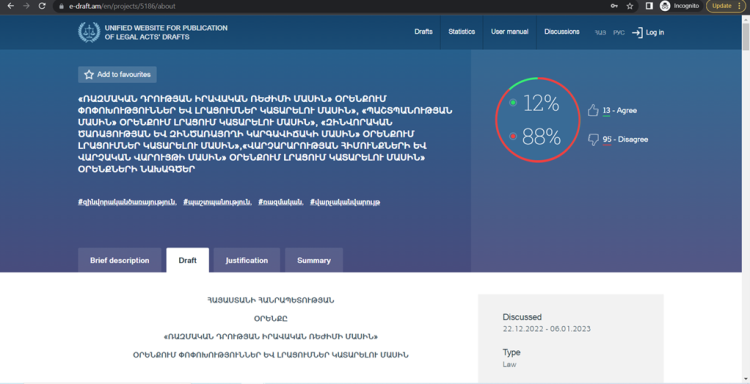
On December 22, 2022 the Ministry of Justice published the draft on making amendments and supplements to the RA Law “On the Legal Regime of Martial Law” on e-draft.am, the unified website for publication of legal acts’ drafts. Among other proposed provisions, the draft envisages the following measures that might be applied in case of declaration of martial law:
- restriction of freedom to expression, as well as temporary confiscation or detention of printing devices, radio broadcasting, sound amplifying equipment, copiers; establishment of a special procedure for accreditation of journalists and special rules for using communication means;
- restriction of content broadcast on television and disseminated via the Internet, ensuring showing movies and TV programs and disseminating information with exclusively military-patriotic content;
- temporary suspension (blocking) of websites, social networks, Internet applications, as well as partial or complete restriction of Internet access in the territory of the Republic of Armenia.
According to the draft, the government shall define the procedure of the temporary suspension of internet sites, social networks, internet applications, and restriction of internet access.
Concerns around the draft
The proposed restrictions raised concerns among media organisations and civil society experts. Acknowledging that restrictions of freedom of expression might take place in the times of war, they indicate that the provisions included in the draft are very broad and unclear, providing room for discretionary approach and unproportionate application of restrictions. The criteria for restrictions are not defined and the mechanisms of following up the proportionality and necessity of decisions on restrictions are not set.
The Armenian Human Rights Defender (ombudsman) published a statement, mentioning that the amendments can bring serious restrictions to human rights, particularly freedom of expression and access to information. In addition, she noted that it is not clear which state body will be entrusted with deciding what content is acceptable or not when martial law is declared, and urged to review to the problematic provisions.
Learning from the past lessons and need for information security
During the Artsakh war in 2020, websites and TikTok social media were temporarily blocked, but this was not officially acknowledged as there was no legislative basis for such restrictions. A statement was made by the Human Rights Defender that the aggressive content, hate speech and calls to violence are particularly disturbing in social media, while in case of TikTok, widely used by children, there are less possibilities for content control. A number of restrictions on the media publications were also applied during the war time based on the government decision. Many publications were removed and media outlets were fined during that period. CSOs and international organisations criticised some of the restrictions, which then the government lifted. Experts note that the government did not take lessons from the war, as the disinformation and panic during the war was due to the lack of timely and accurate official information.
There is a general agreement among experts that some restrictions in online space are necessary during the war, and it is vital to take measures against fake news, disinformation, propaganda of violence as well as cyber-attacks. In this regard, however, an information security expert mentions that the development of information security strategy along with relevant tools is a priority, while unjustified and unproportionate restrictions may lead to further distrust towards official information.
Need for proper consultations with the public and CSO experts
CSOs working in the area of freedom of expression and access to information published a statement criticising the amendments. They demand the government to refrain from circulating the draft further and hold public discussions to analyse the ideas behind the proposed amendments. They also ask the government to establish a working group to draft a new bill that will not contain formulations allowing for subjective interpretations and arbitrary actions; submit the new version of the draft law for international examination; consult expert community when deciding to apply restrictions in the conditions of martial law, and develop mechanisms for exercising public supervision over the execution of these decisions.
In addition to the concerns related to the content of the draft law, it is also disturbing that the government did not duly consult with the public and civil society in the early stages of developing legal amendments. The terms of collecting suggestions via the e-draft platform (22 December – 6 January) covered the period of holidays, thus actually limiting the time for feedback.
The representative of the Ministry of Justice mentioned in a news report that the draft will be further revised based on the comments and proposal received.
